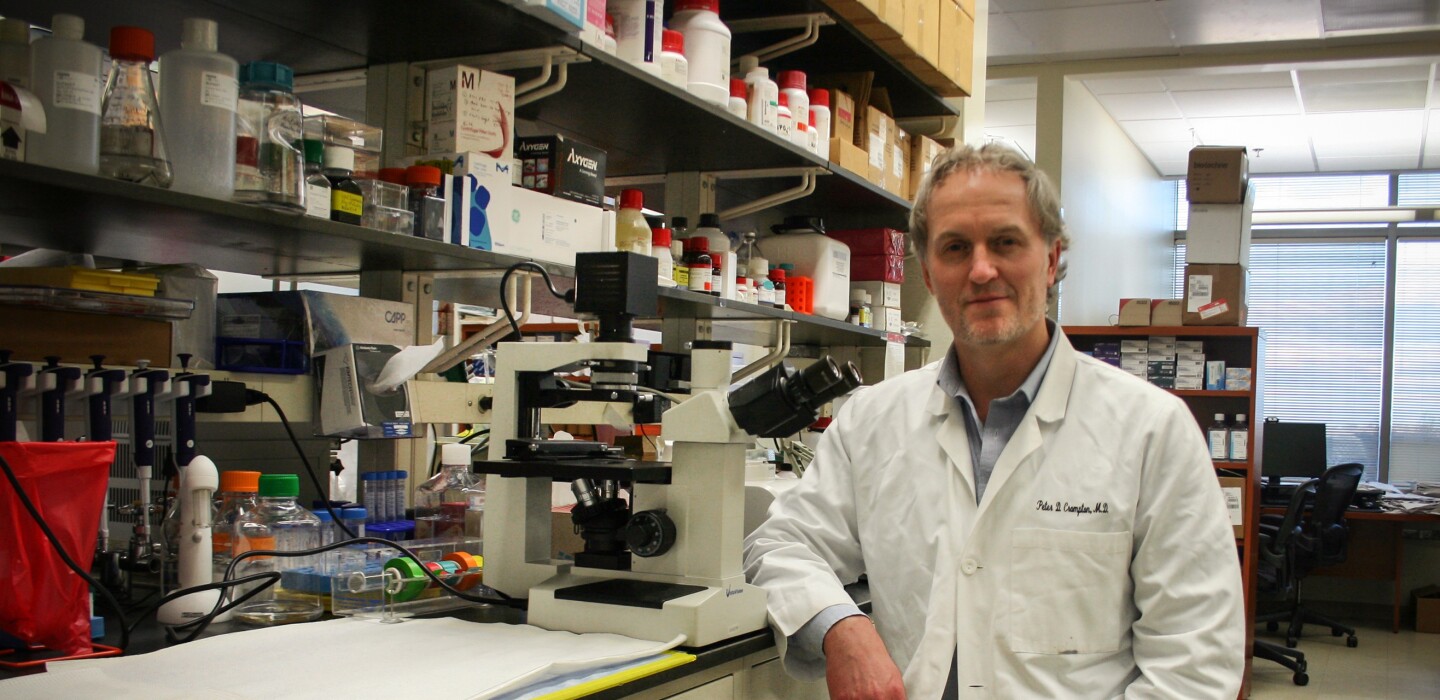[ad_1]
The latest breakthrough in a quest to prevent malaria can be traced to a biology lab at the old Bemidji High School.
Peter Crompton, a 1989 BHS graduate, leads an international team of researchers that has developed an antibody drug that provided protection against malaria infections during the six-month rainy season in the West African republic of Mali.
The result, which was published in the New England Journal of Medicine, lays the groundwork for a new tool to help defeat a parasitic disease that last year killed more than 600,000 people, mostly children.
Crompton, 51, is chief of the Malaria Infection Biology and Immunity Section at the National Institutes of Health. A graduate of Boston University and The Johns Hopkins University of Medicine, he says the spark for his career was ignited in his sophomore year of high school when he took a biology class taught by Bruce Aalgaard.

Contributed
“The single most influential teacher for me in high school was Mr. Aalgaard,” Crompton said. “He was just very excited to teach us about biology. It was infectious, no pun intended, and it really rubbed off on us. He was a very engaging teacher. It was really the first time in high school where I felt genuinely excited about what I was studying.”
Aalgaard, who retired in 1999 after 26 years at BHS and 31 years of teaching overall, was thrilled to hear the recent news about Crompton’s work.
“In sophomore biology, we do some parasitology stuff,” Aalgard said, speaking as though he was still in the classroom. “Part of that was to go through the malaria life cycle. So Peter learned about the entire life cycle of the plasmodium malariae. It makes me feel like my life was actually worthwhile as a teacher when I hear stories like that.”
Peter was born in Connecticut, the third of Don and Wiltse Crompton’s eight children. The growing family moved to Bemidji when Peter was entering kindergarten. Don was a professor of social work at Bemidji State University and Wiltse worked part-time as an occupational therapist. The family lived on Bixby Avenue near the BSU campus.
“It was an ideal childhood growing up in Bemidji,” Peter said. “We had lots of freedom. I had a lot of great friends, and we used to love just riding our bikes around town. It was kind of a wonderland for outdoor activities. When I look back on Bemidji I just have tremendous nostalgia for a wonderful childhood. I feel really lucky to have been raised there.”
Peter’s father died at age 57. His mother currently lives in Austin, Texas, near her three daughters. The oldest, Amy, is a physician’s assistant in dermatology. Sarah is a special education teacher. The younger Wiltse works with impoverished people as a nurse practitioner.
The Crompton boys are spread across the country. Peter is based in Maryland. Patrick lives in Arizona and has done work in research and microfinance and did research in Uganda. Joe is a cancer surgeon and immunologist in California. Nick is vice president of facilities and construction for an Illinois-based health care provider. The youngest son, Seth, lives in the Twin Cities.
Peter and his wife, Lia, have three daughters, Eve, Mary and Lucy.

Contributed
Joe Compton said he admires his brother for the selfless work he has done at the National Institutes of Health.
“I’m super proud of him,” Joe said. “He’s been doing this malaria research for 20 years, and he’s just developed a drug that could potentially save hundreds of thousands of lives. To do that is pretty remarkable. You can do this kind of work for a lot of reasons. You can do it for prestige and money, but Pete really cares about the people in West Africa and the people who can potentially benefit from this. I’ve always admired that about him.”
After graduating from BHS, Peter majored in molecular biology and biochemistry at Boston University. At Johns Hopkins, he earned both a medical degree and a master’s in public health. He also became interested in international health issues while traveling in Africa and South America during his college years.

Contributed
“I really became intrigued by diseases that affect people who live in sort of low- and middle-income countries,” he said. “I did a fellowship in infectious disease at the National Institute of Allergy and Infectious Disease at the NIH.”
Instead of leaving the NIH when the fellowship ended, he stayed on and eventually became a tenured track investigator and then a tenured scientist. His interest in malaria grew, especially after he traveled to West Africa.
“In the summers during college and med school I would look for projects overseas,” Peter said. “After my first year of med school, I met a classmate who had grown up in Zaire (now the Democratic Republic of the Congo). We bought an old coffee barge and traveled up and down the river system distributing ivermectin to prevent river blindness.
“It was kind of a ragtag operation, but I just realized these people have little or no access to medical care, and with very little effort a couple of medical school punks could make a difference.”

Contributed
Peter said he was inspired by his father to do that kind of work.
“My dad had a huge influence on me, in terms of thinking about underserved populations,” he said. “He worked a lot with the Native American folks in Red Lake, Leech Lake and White Earth (Nations). Seeing him in a career where he’s trying to help people who have less access to the resources that a lot of us enjoy, I think was really inspiring.”
Peter said while the recent malaria breakthrough is rewarding, his work is far from over.
“To be doing this type of work at this stage of my career is really a privilege,” he said. “This study was done on healthy adults in Africa. The population that suffers the most from malaria are young kids in sub-Saharan Africa and pregnant women.”
To that end, Crompton’s team is doing studies with children in Mali and Kenya, which will be followed by studies on pregnant women.
“If they prove to be safe and effective in these populations of kids and pregnant women then my goal would be to facilitate the studies that would need to be done to get this essentially approved and then implemented,” Peter said. “More than a half million kids die every year from malaria. I would be very happy in the next 10 years to see this come to fruition.”
[ad_2]
Source link




